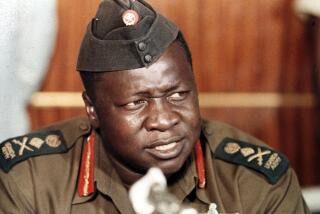His turn at last?
- Share via
FOR almost 25 years, Forest Whitaker has been a presence in Hollywood. He’s worked as an actor (“Good Morning, Vietnam,” “The Crying Game,” Clint Eastwood’s “Bird”), a director (“Hope Floats,” “Waiting to Exhale”) and a producer (“Chasing Papi,” “Green Dragon”). Over that time, his performances have netted him much acclaim, including last month’s best actor award from the Hollywood Film Festival for his recent turn as Ugandan dictator Idi Amin in “The Last King of Scotland.” That role has also been generating much Oscar buzz. We check in with him to see what the experience has been like:
You met with Amin’s friends and family for this role. What was that like?
Forest Whitaker: It was hard. Amin’s brother was really reluctant to sit down with me. He was concerned it was going to be like every other film, just a cardboard cutout of an insane man.
You spent a lot of time playing this paranoid, distrustful man. Did that affect your real life?
FW: When I was in Uganda, I was totally immersed in the character. The only time I broke out of it was for phone calls home. And, yeah, it bled through. There were times when my wife would say, “Oh, yeah, the dictator’s on the phone again.”
What did you find in this role that you hadn’t found in other films?
FW: Amin was so large, so mythic in his proportions; his passions were so intense. Playing him was unlike anything I’ve done. His energy is so strong that there were times when I was surprised at my reactions, surprised at the things I was doing.
What insights did you gain from playing a dictator?
FW: When you look at these mass murderers of the 20th century, we always think of them as the embodiment of evil, just pure darkness. But we forget that these people rose to power. In order to get so many people to follow you requires enormous charisma. I’ve spoken to journalists who covered Amin, and they’ve told me it was very easy to be seduced by the man.
You’ve worked with some legends. Which directors are your favorites, and why?
FW: I’ve worked with so many amazing people, I don’t want to make light of any of them. But Clint really created an environment that was so safe for the actors, it was really different. I was so young then, but Clint trusted me. I realized I could do this, that it was time to step up. That really helped me. So did shooting “Ghost Dog” with Jim Jarmusch. I was playing a samurai, so there’s a real sense of silence within the character. There were a lot of scenes when the only way certain things could be communicated was if I thought them and hoped that the audience would feel it. That was scary, and a powerful lesson.
Is the Oscar hype getting to you?
FW: Look, this movie was shot for $8 million. It’s got a limited release. Mainly, I hope all this buzz will get it into more theaters. There are really important things being discussed in this movie, things that are very relevant today with the situation in Iraq, Darfur.
How have your years in the movie biz changed you?
FW: There’s that Rutger Hauer line from “Blade Runner”: “I’ve seen things you humans wouldn’t believe” -- well, yeah, it’s been a bit like that.
More to Read
Only good movies
Get the Indie Focus newsletter, Mark Olsen's weekly guide to the world of cinema.
You may occasionally receive promotional content from the Los Angeles Times.










